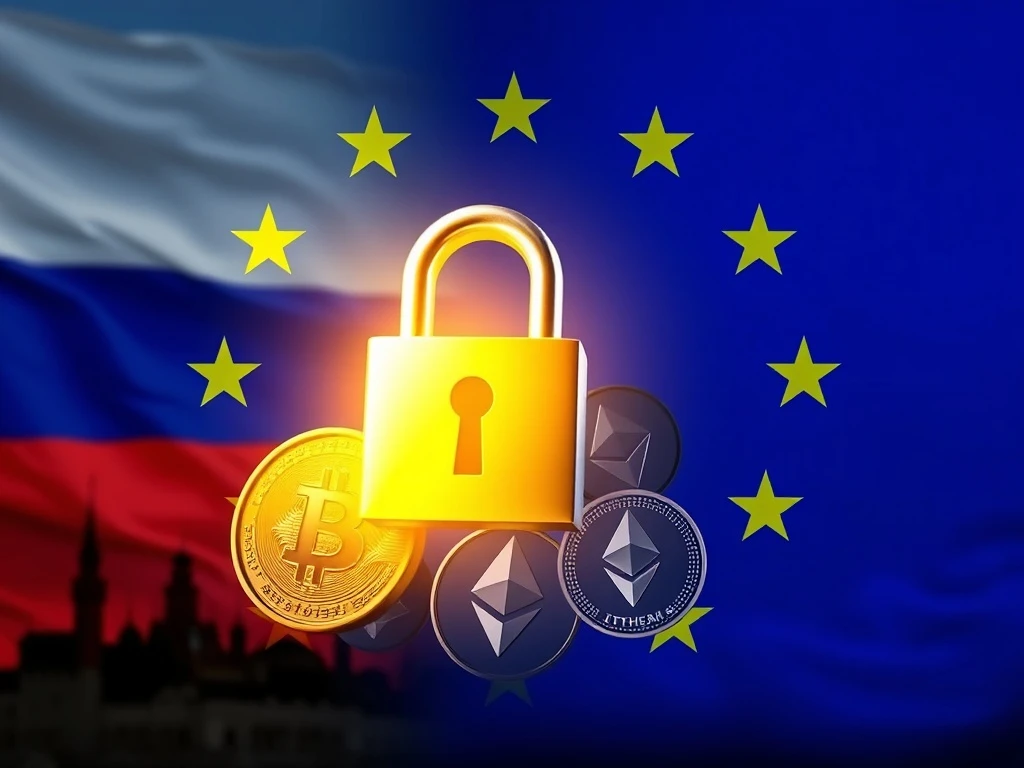Crucial EU Crypto Sanctions Mark Unprecedented Crackdown on Russian Transactions

The European Union has unveiled a groundbreaking move, imposing crucial EU crypto sanctions directly on cryptocurrency platforms. This marks a significant escalation in its financial pressure on Russia. The new measures aim to curb Russia’s ability to circumvent traditional financial restrictions. Furthermore, this unprecedented step signals a new era for digital asset regulation globally. Cryptocurrency users and platforms worldwide now face a changing landscape.
Unpacking the EU’s Latest Financial Sanctions Against Russia
The European Union is preparing its 19th package of financial sanctions against Russia. This comprehensive new package specifically targets digital asset services for the first time. European Commission President Ursula von der Leyen confirmed these measures on Friday. The proposed sanctions seek to prohibit all cryptocurrency transactions for Russian residents. Additionally, they restrict dealings with foreign banks linked to Russia’s alternative payment systems. These restrictions also extend to entities operating within Russian special economic zones.
Von der Leyen stated, “As evasion tactics grow more sophisticated, our sanctions will adapt to stay ahead.” She added, “Therefore, for the first time, our restrictive measures will hit crypto platforms and prohibit transactions in cryptocurrencies.” The statement underscores the bloc’s commitment to tightening its economic grip. All 27 EU member states must still approve these sanctions. This approval process ensures collective action across the union.
The Rationale Behind Targeting Russia Crypto Transactions
The EU’s decision to target Russia crypto transactions directly responds to recent aggressive actions. These include large-scale drone and missile attacks against Ukraine. Some Shahed drones even violated EU airspace in Poland and Romania. Evidence suggests that Russia has used digital assets to bypass existing sanctions. Reuters reported in March that Russian oil companies allegedly conducted tens of millions of dollars in monthly transactions. These transactions reportedly used Bitcoin (BTC) and Tether’s USDt (USDT). Four sources with direct knowledge confirmed these activities.
Moreover, law enforcement agencies have already acted against crypto-related illicit activities. In July, the US Department of Justice charged Iurii Gugnin, a Russian national. Gugnin, also known as George Goognin, faced 22 criminal counts. These included laundering over $540 million through his crypto companies, Evita Investments and Evita Pay. He facilitated transactions for sanctioned Russian entities. These cases highlight the urgent need for stricter oversight on cryptocurrency platforms.
The Global Push for a Bitcoin Reserve in Ukraine and Beyond
While the EU tightens its grip, Ukraine is exploring digital assets for national resilience. Ukraine seeks to empower its financial system with a proposed national Bitcoin reserve Ukraine. Yaroslav Zhelezniak, a member of parliament, confirmed this plan to Incrypted in May. A draft bill is currently in its final stages. This proposal was announced during the Crypto 2025 conference in Kyiv on February 6. Zhelezniak stated, “We will soon submit a draft law from the industry allowing the creation of crypto reserves.”
Bitcoin is gaining recognition as a strategic national asset globally. US President Donald Trump signed an executive order on March 7. This order established a national Bitcoin reserve, seeded with BTC confiscated from criminal cases. A month later, Swedish MP Rickard Nordin urged his Finance Minister to consider Bitcoin. He cited its growing recognition as a “hedge against inflation.” These developments illustrate a dual narrative for cryptocurrencies: a tool for evasion for some, a strategic asset for others.
Navigating the Future of Cryptocurrency Platforms Under Global Scrutiny
The latest EU sanctions package fundamentally alters the operating environment for cryptocurrency platforms. This shift introduces new compliance burdens and regulatory complexities. The move underscores a global trend toward increased governmental oversight of digital assets. Consequently, platforms must enhance their Anti-Money Laundering (AML) and Know Your Customer (KYC) protocols. They must also adapt to rapidly evolving international legal frameworks.
The conflict between blockchain stakeholders’ desire for privacy and state control remains a “constant battle.” Regulators aim to prevent illicit finance. However, they also risk stifling innovation in the digital asset space. This delicate balance will shape the future of crypto. Companies in the sector must navigate these challenges carefully. The EU’s actions set a powerful precedent. This will likely influence future regulatory decisions worldwide.
The EU’s bold step to sanction cryptocurrency platforms marks a pivotal moment. It signals a determined effort to close all avenues for sanctions evasion. This move against Russia crypto transactions highlights the growing importance of digital assets in geopolitical conflicts. Simultaneously, nations like Ukraine explore Bitcoin as a tool for financial resilience. This dual perspective showcases the dynamic and complex role cryptocurrencies now play on the global stage. The industry must prepare for an era of heightened scrutiny and adaptive regulation.









